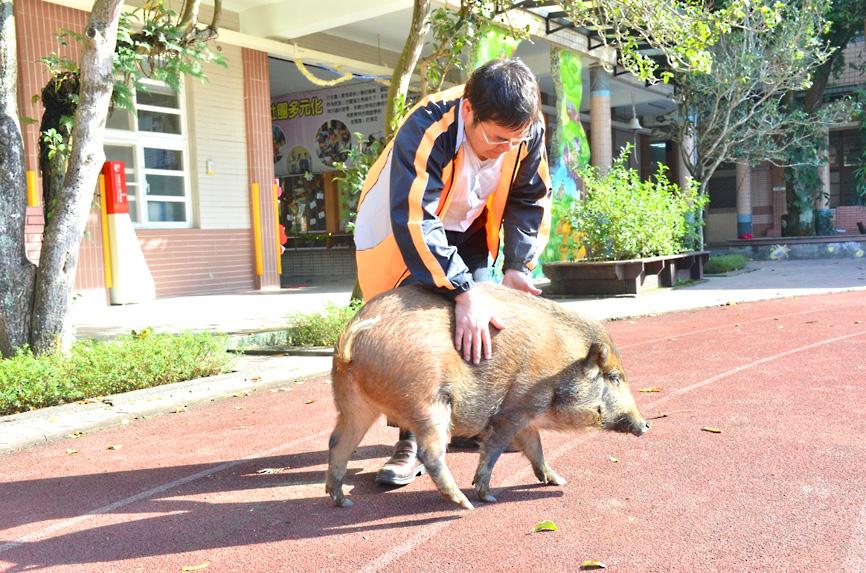People should consider their options thoroughly before getting a pig as a pet, as it is a very different experience from caring for more traditional household animals, a pet adoption service said last month.
Typical misconceptions about pigs are that they are dirty, smelly and germ-ridden, but these ideas are rooted in the human psyche, said a founding member of the Happy Pigs’ Home adoption service, who asked to be identified as Anita.
People’s perception of pigs is key to whether the pigs feel happy, Anita said, adding that potential owners must fully understand what a pet pig would mean to the household.

Photo: Lee Jung-ping, Taipei Times
Families with elderly or young members should be careful, as their slower reaction times could lead to injury with a pig in the home, she said.
Pigs are extremely territorial and tend to only recognize one master for life, which could cause friction between couples, Anita said, adding that some couples have argued and even divorced over a pet pig.
Potential owners should consider emulating owners abroad and have their pigs sleep with them, she said.
Blankets are essential, as pigs do not have much hair to keep them warm, she said.
Owners should not leave food lying around and might even need to chain up their refrigerators to prevent their pet from accessing it, Anita said.
As sound pollution can be an issue, people who live in less urbanized areas or have sound-proofed homes would be more suited to owning a pet pig, she said.
Pigs are known to distance themselves from owners who cage them and as they grow and become unruly, they require larger enclosures, which generates a vicious cycle, Anita said.
Pigs are very clean, she said.
They do not have a strong body odor and prefer not to defecate where they sleep, she said, adding that the stereotypical view of dirty and smelly pigs is because owners fail to clean them.
Pigs do have a propensity to play in mud and are liable to become dirty when going outside, she said, but added that they are easy to clean because they do not have much hair.
Pigs are omnivorous, and their diet should comprise of roots, leaves, fruit, oatmeal and olive oil, Anita said, adding that piglets under three months old also need milk.
Powdered milk is also acceptable, she added.
For owners, medical fees are the prime expense, Anita said, citing the sterilization of female pigs as an example.
The surgery, which should be done by a veterinarian familiar with pig anatomy, plus the anesthetic — which must be given according to a pet’s size — means the procedure is more expensive than for more common pets, Anita said.
Pig owners should neuter or spay their pets when they are little, she said.
Pet pigs enjoy interacting with their owners and demand a lot of attention, she said, adding that they also need periodic walks, as this helps their digestion.

Taiwan has received more than US$70 million in royalties as of the end of last year from developing the F-16V jet as countries worldwide purchase or upgrade to this popular model, government and military officials said on Saturday. Taiwan funded the development of the F-16V jet and ended up the sole investor as other countries withdrew from the program. Now the F-16V is increasingly popular and countries must pay Taiwan a percentage in royalties when they purchase new F-16V aircraft or upgrade older F-16 models. The next five years are expected to be the peak for these royalties, with Taiwan potentially earning

STAY IN YOUR LANE: As the US and Israel attack Iran, the ministry has warned China not to overstep by including Taiwanese citizens in its evacuation orders The Ministry of Foreign Affairs (MOFA) yesterday rebuked a statement by China’s embassy in Israel that it would evacuate Taiwanese holders of Chinese travel documents from Israel amid the latter’s escalating conflict with Iran. Tensions have risen across the Middle East in the wake of US and Israeli airstrikes on Iran beginning Saturday. China subsequently issued an evacuation notice for its citizens. In a news release, the Chinese embassy in Israel said holders of “Taiwan compatriot permits (台胞證)” issued to Taiwanese nationals by Chinese authorities for travel to China — could register for evacuation to Egypt. In Taipei, the ministry yesterday said Taiwan

Taiwan is awaiting official notification from the US regarding the status of the Agreement on Reciprocal Trade (ART) after the US Supreme Court ruled US President Donald Trump's global tariffs unconstitutional. Speaking to reporters before a legislative hearing today, Premier Cho Jung-tai (卓榮泰) said that Taiwan's negotiation team remains focused on ensuring that the bilateral trade deal remains intact despite the legal challenge to Trump's tariff policy. "The US has pledged to notify its trade partners once the subsequent administrative and legal processes are finalized, and that certainly includes Taiwan," Cho said when asked about opposition parties’ doubts that the ART was

If China chose to invade Taiwan tomorrow, it would only have to sever three undersea fiber-optic cable clusters to cause a data blackout, Jason Hsu (許毓仁), a senior fellow at the Hudson Institute and former Chinese Nationalist Party (KMT) legislator, told a US security panel yesterday. In a Taiwan contingency, cable disruption would be one of the earliest preinvasion actions and the signal that escalation had begun, he said, adding that Taiwan’s current cable repair capabilities are insufficient. The US-China Economic and Security Review Commission (USCC) yesterday held a hearing on US-China Competition Under the Sea, with Hsu speaking on